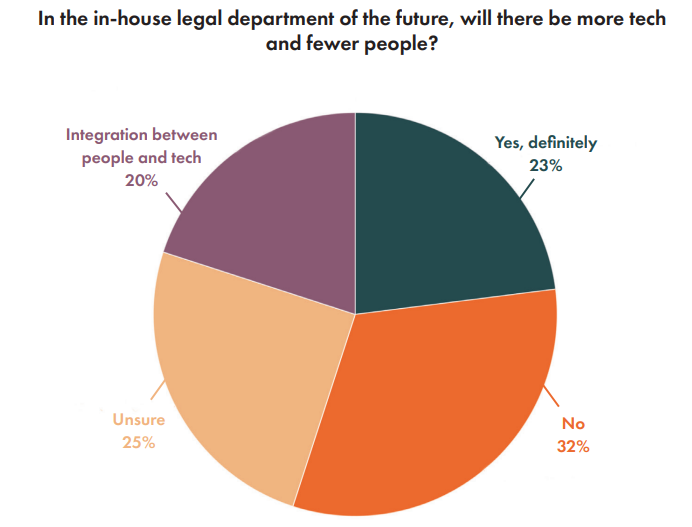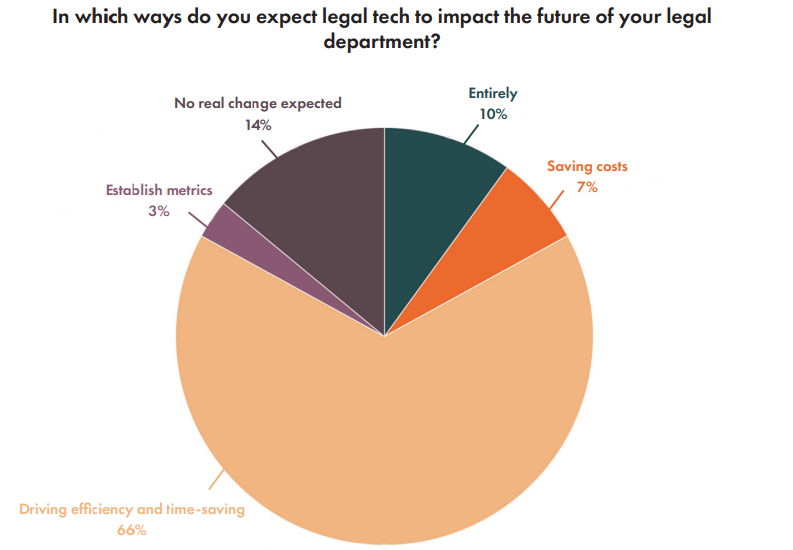
Automation and digitization of processes certainly help legal departments in daily mansions allowing them to focus on more time-consuming and demanding tasks. Legal tech is evolving faster, providing solutions to several matters that previously fell under the scope of lawyers. However, it is essential to understand the limits of such trends and what the legal department of the future will look like.
23% of respondents think that the in-house legal departments of the future will definitely have more tech and fewer people. However, in this scenario, GCs seem to believe that there will be a true revolution in the profile of the legal team and the function it will assume within the company. As one respondent suggests, even though the number of people may decrease slightly, there will be the opportunity to operate on a more meticulous selection based on a higher standard to carry out high-quality work. In-house lawyers generally look at this possibility positively, recognising it as an opportunity for lawyers to move up on the value chain, partnering with first-line business teams and providing strategic legal input.
The majority of respondents to this question regarding in-house legal departments of the future believe that legal tech does not mean there will be fewer people in legal departments in response to an increase in reliance on legal tech. A common argument put forward in responses is that ‘automation only eases the pain, but does not necessarily reduce the need for human insight and experience.’
Among GCs surveyed, the human element is considered a key factor that can never be fully removed from in-house counsel, not only because it offers a more creative approach to advice and essential decision-making but also because it allows for building relationships with other departments and business partners, which are crucial in risk management and strategic decision-making process which will enable the business to function and expand. As one GC puts it, ‘my strong belief is that the human factor to the legal professional shall never be replaced by technology.’
A noticeable minority of 20%, however, predicts that the legal department of the future will be a mix between people and tech, with a strong integration between the two. A common pattern in these respondents’ answers is that legal tech and people are not mutually exclusive, but meant to complement each other.


Responses to this question have been varied. Overall, a majority of 86% expect legal tech to bring changes into the legal department of the future. Analysing this data further, we can identify three major categories in the data.
10% of respondents believe legal tech will entirely change the way the legal department operates within the business, touching upon every area: ‘The more you can implement legal tech tools, the more you manage to keep the legal department updated with trends and tasks that the legal department is expected to fulfil. In other words: you need legal tech to keep the legal department competitive in the long run.’
This is contrasted to 7%, who believe that the main change will be reflected in saving costs, while a vocal minority of 3% claim future legal tech will primarily allow establishing clear metrics for KPIs. As one GC puts it: ‘it will allow calculating metrics into the legal analysis, representing a tangible benefit for our internal clients.’
Additionally, the majority of respondents at 66% of all surveyed believe legal tech will positively affect driving efficiency and save time. One of the respondents noted, ‘legal tech will evolve to more suitable and efficient solutions that will manage low risk-high volume repetitive tasks, saving time and resources as well as budget, generating creative and value-added legal work.’
Oddly enough, the remaining 14% did not expect legal tech to bring a noticeable change in the way legal departments operate, especially in the near future. However, given the pace at which legal tech and other major tech tools have developed in even the last two decades and its substantial changes to in-house legal teams currently operate, it’s clear that we’ll soon have a much clearer picture of what the legal department of the future will look like. And unlike this minority of respondents, the majority expect legal tech to help their development every step of the way.


